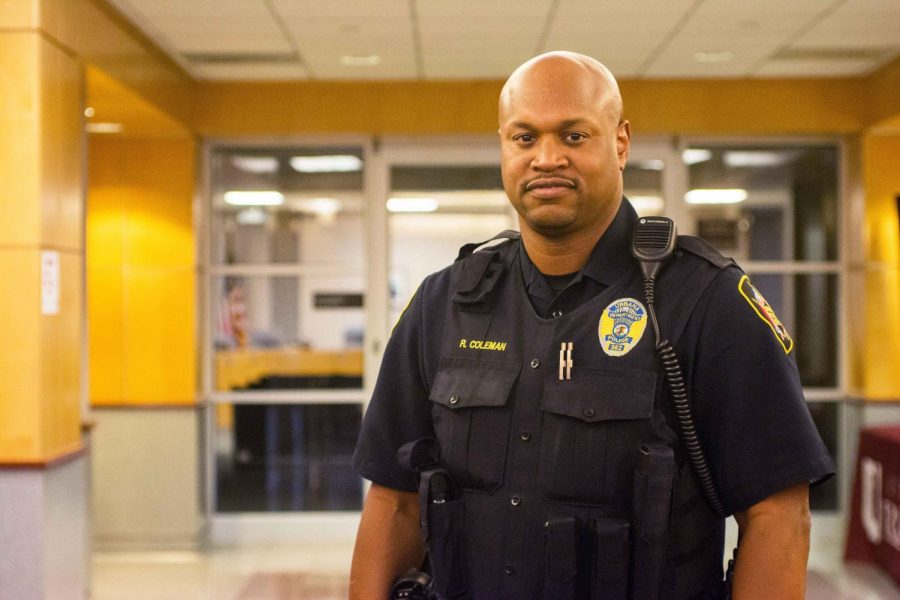Explaining the myths behind missing person reports
A portrait of Detective Robert Coleman.
November 13, 2017
Myth: You must wait at least 24 hours before reporting a missing person to authorities.
Richard Coleman, investigative unit detective at the Urbana police department, said many people believe this statement to be true, most likely because it is popularized in movies and TV shows such as CSI.
“Call us right away with as much information as you can give us. Don’t hesitate,” Coleman said. “Don’t go out and think you can find this person. If you are going to do that, contact us right away so we can send out resources.”
Coleman said his department can have up to 15 people out in the community looking for missing person. He also said between the five to eight investigators and six patrol officers, as well as other departments, help can be provided.
All residents have to do is call.
Get The Daily Illini in your inbox!
Joe Gallo, deputy chief at the Champaign Police Department, is confused about this myth as well. Gallo has been a police officer for 27 years and he said he does not recall any policies in his time at the department that required a waiting period.
“I don’t know if people are just seeing that on TV, or where that number came from, but certainly there is no waiting period required for reporting a missing person,” Gallo said.
Gallo explained there is no benefit to waiting, and that waiting can even present a greater threat to the person missing.
“If you put some logic to that whole concept, if someone came to (the Champaign Police) and said their 14-year-old child is missing and there’s suspicious circumstances, why in the world would we wait 25 hours to file a report?” Gallo said.
Patrick Wade, the communications director for the University police, explained that no matter the time period, when a person is reported missing, an investigation is launched.
“I know in the movies and in TV we hear about some kind of 24-hour, 48-hour rule, that’s not what is it in reality,” Wade said.
Wade said while time to report does not matter, a sense of urgency differs from case to case. Cases where Wade said there’s any kind of evidence a person has gone missing, particularly against their will, or they have media issues, or an increased risk of danger, there is an urgency.
Reports of missing people vary, Wade explained. These reports are not a rare occurence for the local police departments.
“It’s not uncommon for someone to be reported missing. In a lot of cases that person has kind of cut off contact voluntarily,” Wade said. “That happens too, but as soon as that person is reported missing to us, we will launch into our investigation and try to find that person.”
As soon as we get that report, we start our investigation. Wade said a general investigation follows these steps: Visit the missing person’s residence to see if they are there. Check a cell phone to see recent contact, through text message or social media. Talk to people connected with the missing person, to see if they have had any recent communication
Wade explained typically through this initial step in the investigation, the police get some kind of clues or leads into where this person may have been going. The investigation then continues from this information.
This process is how the University’s missing scholar case was initially handled as well. Wade said from the initial investigation, police were able to determine she was headed to sign a lease and took buses as a mode of transportation.
While Yingying Zhang’s case is severe, others have struck Illinois in the past.
In 2015, Wade explained there was a student reported missing to the police. This student, Vicente Mundo, was reported missing to the University and Champaign police and was later found after having been shot and killed.
Another case occurred right before Mundo’s disappearance, when 2014 University graduate Cristian Zamora went missing. Wade said he also passed away.
Wade labeled this case as another extreme case.
“When we get that initial report, we always treat it as a severe case,” Wade said. “We say, ‘this person could be in trouble.'”
All three members of the police agree that it is always better to report and ask for help.
“If you look at any missing person report, especially when there is foul play suspected, the sooner you can address the facts and try to take measures, the better your outcome is going to be,” Gallo said. “The quicker we can respond, the better the outcome in most situations.”







